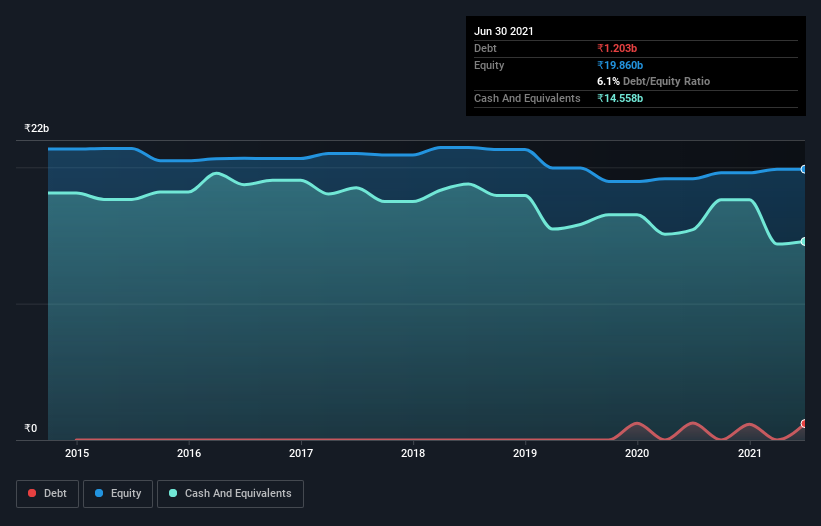- India
- /
- Metals and Mining
- /
- NSEI:KIOCL
These 4 Measures Indicate That KIOCL (NSE:KIOCL) Is Using Debt Reasonably Well

The external fund manager backed by Berkshire Hathaway's Charlie Munger, Li Lu, makes no bones about it when he says 'The biggest investment risk is not the volatility of prices, but whether you will suffer a permanent loss of capital.' When we think about how risky a company is, we always like to look at its use of debt, since debt overload can lead to ruin. We can see that KIOCL Limited (NSE:KIOCL) does use debt in its business. But the more important question is: how much risk is that debt creating?
When Is Debt A Problem?
Debt and other liabilities become risky for a business when it cannot easily fulfill those obligations, either with free cash flow or by raising capital at an attractive price. If things get really bad, the lenders can take control of the business. While that is not too common, we often do see indebted companies permanently diluting shareholders because lenders force them to raise capital at a distressed price. Having said that, the most common situation is where a company manages its debt reasonably well - and to its own advantage. The first step when considering a company's debt levels is to consider its cash and debt together.
Check out our latest analysis for KIOCL
What Is KIOCL's Net Debt?
The chart below, which you can click on for greater detail, shows that KIOCL had ₹1.20b in debt in March 2021; about the same as the year before. However, it does have ₹14.6b in cash offsetting this, leading to net cash of ₹13.4b.

How Healthy Is KIOCL's Balance Sheet?
The latest balance sheet data shows that KIOCL had liabilities of ₹2.93b due within a year, and liabilities of ₹2.03b falling due after that. On the other hand, it had cash of ₹14.6b and ₹3.26b worth of receivables due within a year. So it actually has ₹12.9b more liquid assets than total liabilities.
This surplus suggests that KIOCL has a conservative balance sheet, and could probably eliminate its debt without much difficulty. Succinctly put, KIOCL boasts net cash, so it's fair to say it does not have a heavy debt load!
Although KIOCL made a loss at the EBIT level, last year, it was also good to see that it generated ₹6.1b in EBIT over the last twelve months. There's no doubt that we learn most about debt from the balance sheet. But it is KIOCL's earnings that will influence how the balance sheet holds up in the future. So if you're keen to discover more about its earnings, it might be worth checking out this graph of its long term earnings trend.
Finally, a business needs free cash flow to pay off debt; accounting profits just don't cut it. KIOCL may have net cash on the balance sheet, but it is still interesting to look at how well the business converts its earnings before interest and tax (EBIT) to free cash flow, because that will influence both its need for, and its capacity to manage debt. Over the last year, KIOCL reported free cash flow worth 11% of its EBIT, which is really quite low. That limp level of cash conversion undermines its ability to manage and pay down debt.
Summing up
While we empathize with investors who find debt concerning, you should keep in mind that KIOCL has net cash of ₹13.4b, as well as more liquid assets than liabilities. So we don't have any problem with KIOCL's use of debt. The balance sheet is clearly the area to focus on when you are analysing debt. But ultimately, every company can contain risks that exist outside of the balance sheet. These risks can be hard to spot. Every company has them, and we've spotted 1 warning sign for KIOCL you should know about.
If, after all that, you're more interested in a fast growing company with a rock-solid balance sheet, then check out our list of net cash growth stocks without delay.
When trading KIOCL or any other investment, use the platform considered by many to be the Professional's Gateway to the Worlds Market, Interactive Brokers. You get the lowest-cost* trading on stocks, options, futures, forex, bonds and funds worldwide from a single integrated account. Promoted
If you're looking to trade KIOCL, open an account with the lowest-cost platform trusted by professionals, Interactive Brokers.
With clients in over 200 countries and territories, and access to 160 markets, IBKR lets you trade stocks, options, futures, forex, bonds and funds from a single integrated account.
Enjoy no hidden fees, no account minimums, and FX conversion rates as low as 0.03%, far better than what most brokers offer.
Sponsored ContentValuation is complex, but we're here to simplify it.
Discover if KIOCL might be undervalued or overvalued with our detailed analysis, featuring fair value estimates, potential risks, dividends, insider trades, and its financial condition.
Access Free AnalysisThis article by Simply Wall St is general in nature. We provide commentary based on historical data and analyst forecasts only using an unbiased methodology and our articles are not intended to be financial advice. It does not constitute a recommendation to buy or sell any stock, and does not take account of your objectives, or your financial situation. We aim to bring you long-term focused analysis driven by fundamental data. Note that our analysis may not factor in the latest price-sensitive company announcements or qualitative material. Simply Wall St has no position in any stocks mentioned.
*Interactive Brokers Rated Lowest Cost Broker by StockBrokers.com Annual Online Review 2020
Have feedback on this article? Concerned about the content? Get in touch with us directly. Alternatively, email editorial-team (at) simplywallst.com.
About NSEI:KIOCL
KIOCL
Engages in the iron ore mining, beneficiation, and production of pellets in India and internationally.
Adequate balance sheet minimal.
Similar Companies
Market Insights
Community Narratives


